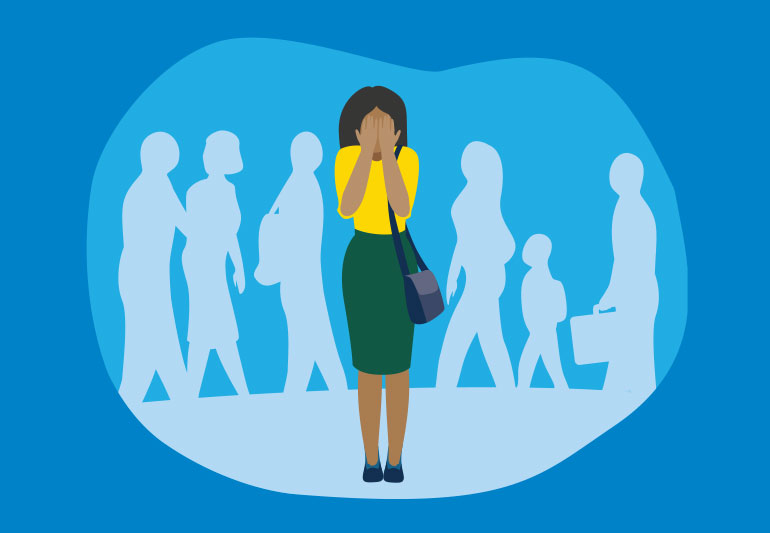We all know what it feels like to be stressed out. Whether it’s from work, school, or personal problems, stress can be a major hindrance to our daily lives. For some people, however, social stress is a major problem. This type of stress can come from any situation in which the person is around other people. In this blog post, we will discuss the different types of social stress, and how to deal with them!
Contents
What Is A Social Stress?
 Social stress is described as the body’s response to any demand placed upon it. This could be in the form of a work deadline, an upcoming social event, or even just a busy day at home with the family. It is the body’s way of preparing itself for action and can be both physical and mental.
Social stress is described as the body’s response to any demand placed upon it. This could be in the form of a work deadline, an upcoming social event, or even just a busy day at home with the family. It is the body’s way of preparing itself for action and can be both physical and mental.
Moreover, social stress is common these days due to the fast-paced, constantly connected lives we lead. A study by the American Psychological Association found that millennials are the most stressed generation, with work being the number one source of stress.
In fact, people who experience chronic social stress are more likely to develop anxiety and depression.
So, what are the different types of social stress? Let’s take a look.
What Are The Types Of Social Stress?
It is believed that there are four main types of social stress:
Time pressure
This is when you feel like you’re running out of time or that there’s not enough time to get everything done. It can be caused by work deadlines, family obligations, or even just a packed schedule. In fact, this type is so common that it’s been nicknamed the “21st-century stress.”
In fact, time pressure is one of the most common types of social stress. For example, a study of college students found that time pressure was the most common type of stress they experienced.
Social evaluative threat
This is often known as “social stress.” It’s when we feel like we’re being judged, and our performance is being evaluated. This could be during a job interview, public speaking, or even just talking to someone we find attractive. We worry that we’ll be found lacking in some way, and this fear can lead to all sorts of problems.
Moreover, people who are prone to social anxiety may also have a harder time dealing with stress in general. That’s because they’re constantly worrying about what other people think of them, and they’re always on edge. This can lead to a whole host of problems, both mental and physical.
Role conflict
When you talk about social stress, this is one of the most common types. It happens when you have two or more roles that are in conflict with each other. For example, you might be a parent and an employee. You’re trying to balance your work life with your home life, and it’s tough. You might feel like you’re not doing either one well.
Role conflict also happens when you have two roles that are both important to you, but they conflict with each other. For example, you might be a student and an athlete. You’re trying to balance your schoolwork with your training, and it’s tough. In fact, you may have felt like you’re not doing either one well.
Interpersonal conflict
 It is a type of stress that is caused by the interactions and relationships that we have with other people. This can be anything from a disagreement with a friend or family member, to workplace conflict, or even something as simple as feeling like you don’t fit in with a group of people.
It is a type of stress that is caused by the interactions and relationships that we have with other people. This can be anything from a disagreement with a friend or family member, to workplace conflict, or even something as simple as feeling like you don’t fit in with a group of people.
For instance, you might have a friend who is always putting you down or a boss who is constantly demanding more from you than you feel like you can handle. These are just two examples of interpersonal conflict, but there are many others.
So, these are four common types of social stress. It is important to remember that social stress is a normal part of life and we all experience it from time to time. However, if you find yourself constantly feeling stressed out or like you can’t cope, it might be worth talking to a therapist about how to deal with it.
What Are The Common Symptoms Of Social Stress?
The signs and symptoms of social stress are different for everyone. Some people may experience physical symptoms others may have emotional symptoms. So let’s take a look into the different types of social stress.
Physical symptoms
There are some of the physical symptoms people experience when they are under social stress:
- Muscle tension
- Sweating
- Fast heartbeat
- Dizziness
- Trembling hands or voice
- Dry mouth
Emotional symptoms
Some of the emotional symptoms people may experience are:
- Anxiety
- Nervousness
- Agitation
- Tension
- Irritability
- Feeling overwhelmed
- Feeling like you can’t cope or manage
- Low self-esteem or self-doubt
Cognitive symptoms
Cognitive symptoms are changes to the way people think. They may have:
- Trouble concentrating
- Trouble making decisions
- Pessimism or negative thinking
- Feeling that everything is hopeless
Intrusive thoughts, worry, and fear are common among people who experience social stress. These symptoms can make it hard to focus on anything else. People may feel like they’re in a fog and have trouble completing simple tasks.
So, these symptoms are indications that a person is under stress. If you are experiencing any of these, it’s important to seek help from a therapist or counselor who can help you manage your stress.
How To Deal With Social Stress?
 There are various things you can do to ease social stress, but it may take some time and effort to find what works best for you. Some helpful ideas include:
There are various things you can do to ease social stress, but it may take some time and effort to find what works best for you. Some helpful ideas include:
Identify your triggers
When you have social stress, there could be certain situations or people that trigger it. Once you identify your triggers, you can try to avoid them or be prepared for them ahead of time. Also, it may help to have a plan for how to deal with them when they do come up. The triggers can be:
- A certain person: If there’s someone in your life who regularly stresses you out, try to limit your time around them or set boundaries.
- An upcoming event: If you know you’re going to be in a situation that makes you anxious, plan ahead by coming up with an exit strategy or having someone you can rely on for support.
- Everyday life: If your social stress is more general, try to find ways to relax and de-stress on a regular basis. This could include things like yoga, meditation, or simple breathing exercises.
Talk to someone
It can be helpful to talk to someone about what you’re going through. This could be a friend, family member, therapist, or any other support system. They can offer you helpful advice and be there for you when you need to vent. You should consider sharing your feelings with your loved ones.
In fact, one needs to understand the power of communication. Do not bottle up your feeling instead talk to someone about them.
Enough sleep
Sleep is the foremost thing that is required to deal with stress. A good night’s sleep can help you feel refreshed and rejuvenated the next day. It can also help you think more clearly and make better decisions. People usually avoid sleep when they are stressed out, but that is actually the worst thing to do.
For this, you can try to establish a regular sleep schedule. Go to bed and wake up at the same time every day, even on weekends. Make sure that your bedroom is dark, quiet, and cool. Avoid watching television or using your computer or phone in bed. Establish a relaxing bedtime routine to help you wind down before sleep.
Exercise regularly
Exercise actually holds a two-fold purpose when it comes to social stress. First, regular exercise has been shown to lower levels of the stress hormone cortisol in the body.
Cortisol is one of the main hormones released in response to stress and can have a number of negative effects on the body. That includes weight gain, high blood pressure, and a weakened immune system.
So, by keeping your cortisol levels in check, you’ll be better equipped to handle social stress when it does occur.
But exercise also provides a great outlet for releasing pent-up tension and frustration. After a long day of work or dealing with stressful social situations, a good workout can help you blow off some steam and relax.
Eat healthy diet
 Diets are important for maintaining mental health. Eating a healthy diet can help reduce stress and promote relaxation. There are many different types of diets that can be beneficial for reducing stress. Some examples of healthy diets include:
Diets are important for maintaining mental health. Eating a healthy diet can help reduce stress and promote relaxation. There are many different types of diets that can be beneficial for reducing stress. Some examples of healthy diets include:
- Mediterranean diet
- DASH diet
- Plant-based diet
In fact, these diets are helpful in reducing stress because they are rich in nutrients that can help to promote relaxation. These nutrients include:
- Vitamins B and C
- Magnesium
- Omega-three Fatty Acids
All of these nutrients are essential for reducing stress and promoting relaxation.
Practice meditation
Meditation is believed to help with social stress in a few ways. One is by teaching you how to focus on the present moment, which can be helpful when anxiety-inducing thoughts about the past or future start creeping in.
Additionally, meditation can help “quiet” the part of your brain that’s responsible for fight-or-flight mode, aka the sympathetic nervous system. This can lead to a decrease in stress hormones like cortisol.
Finally, meditation has been shown to boost self-esteem and feelings of social connectedness, both of which are key players in managing social stress.
There are some most effective meditation ways, such as:
- Focusing on your breath
- Visualizing a peaceful place
- Body scan meditation
- Loving-kindness meditation
If you’re new to meditation, it can be helpful to start with a Guided Meditation. Once you get the hang of it, you can practice on your own for as little as five minutes.
Write journals
Journaling is a great way to manage your social stress, it is a form of self-care that can help you to understand and process your thoughts and feelings. When you journal, you can track your stressors, triggers, and symptoms over time. This can help you to identify patterns and develop coping strategies.
There are different types of journals that you can keep, such as a gratitude journal or a worry journal. A gratitude journal is a great way to focus on the positive things in your life, which can help to offset the negative effects of social stress. A worry journal is a place where you can write down your worries and concerns, and then brainstorm solutions for them.
Talk to a therapist
 A therapist can help you understand and come to terms with your social anxiety. They can also work with you on specific strategies to reduce your stress and anxiety in social situations. There are many different types of therapy, so be sure to find one that feels right for you. Some helpful therapies include:
A therapist can help you understand and come to terms with your social anxiety. They can also work with you on specific strategies to reduce your stress and anxiety in social situations. There are many different types of therapy, so be sure to find one that feels right for you. Some helpful therapies include:
Cognitive-behavioral therapy: This type of therapy helps you change the way you think about and react to social situations.
Exposure therapy: This therapy involves gradually exposing yourself to the types of social situations that make you anxious. Over time, you will learn to manage your anxiety in these situations.
So, therapies are numerous and varied, and finding the one that suits you is essential to reaping the benefits.
Join a support group
Support groups are a great way to share your experiences with others who are going through the same thing. It can be helpful to hear how others are coping with social stress and to get tips and advice from people who understand what you’re going through. There are support groups for all sorts of different issues, so you should be able to find one that’s right for you.
So, overall these are some ways to deal with social stress. If you’re feeling overwhelmed, remember that you can always reach out to a friend or family member for support. And if you need more help, don’t hesitate to seek professional help. With the right support, you can learn to manage your social stress and live a happy and fulfilling life.
Moreover, it is important to make a call by yourself whether you want to stay in a group or not. If you feel like the support group is not helping you, it is okay to leave and try something else. Do what feels right for you and don’t be afraid to ask for help when you need it.
Conclusion
To conclude, social stress is a very real phenomenon that can have profound effects on our mental and physical health. It is important to be aware of the different types of social stress, as well as the signs and symptoms that may indicate that we are struggling to cope. If you are experiencing social stress, there are a number of things that you can do to help manage it.
But the most important thing is to remember that you are not alone. Social stress is something that many people struggle with, and there is support available.
For more information, please contact MantraCare. Stress can have both physical and mental effects on the body, leading to negative consequences such as anxiety, depression, and even physical illnesses. If you have any queries regarding Online Stress Counseling experienced therapists at MantraCare can help: Book a trial Stress therapy session


